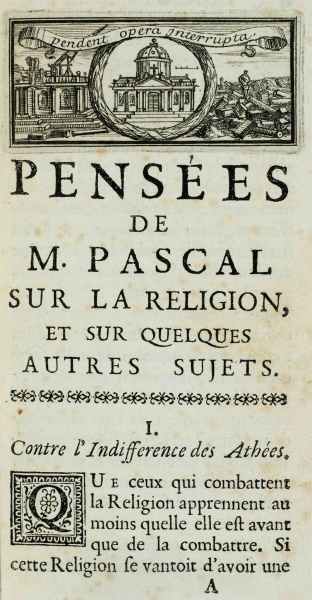Pascal: Pensées
“Le coeur a ses raisons que le raison ne connaît point.” (“The heart has its reasons that reason knows not.”)
These words on the Jesse Philips Humanities Center at the University of Dayton are taken from the Pensées of Blaise Pascal (1623– 1662). They accurately sum up the Pensées of Pascal, to the extent that anyone can.
Pascal, an invalid from childhood, was a mathematician as well as a philosopher. His early works focused on the natural sciences and mathematics. Among other things, he was one of the first to build a mechanical calculator. In 1646, he and his sister Jacqueline became part of the Jansenist movement in French Catholicism. On November 23, 1654, Pascal experienced an intense religious vision, which he recorded in a short work now known as Le mémorial. His subsequent works focused on religion. The Pensées, a defense of the Christian religion, is the most famous and influential of these.
The work remained incomplete at the time of his death. It was left as a collection of random notes and thoughts, in no coherent order. The first edition appeared in 1670, eight years after Pascal’s death, edited by his nephew Abbé Périer. Although there was a preliminary printing in 1669, the 1670 printing is recognized as the true first edition. The Pensées are a defense of faith against rationalism, although it is impossible to derive any system from the notes left by Pascal.
—Fred W. Jenkins, PhD, Professor and Associate Dean for Collections and Operations, University Libraries
Bibliography
Carter, John and Percy H. Muir. Printing and the Mind of Man. 2nd ed., rev. and enlarged. Munich: Pressler, 1983.
Pascal, Blaise. Pensées. Edited by Léon Brunschvicq. Introduction and notes by Domnique Descotes. Paris: Garnier-Flammarion, 1976.
Pascal, Blaise. Pensées: établie pour la première fois d’après la copie de référence de Gilberte Pascal. Edited by Philippe Sellier. Paris: Mercure de France, 1976.

